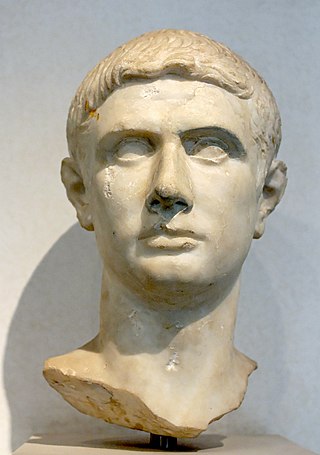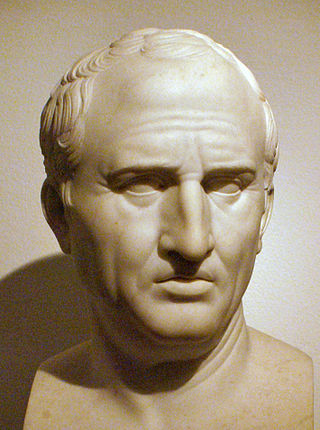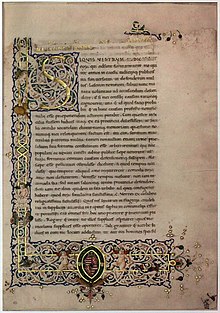Quintus Hortensius Hortalus was a famous Roman lawyer, a renowned orator and a statesman. Politically he belonged to the Optimates. He was consul in 69 BC alongside Quintus Caecilius Metellus Creticus. His nickname was Dionysia, after a famous actress. After his retirement Hortensius took up fish-breeding as a hobby. Cicero spoke of him as a Piscinarius – 'fish fancier'.
Gaius Verres was a Roman magistrate, notorious for his misgovernment of Sicily. His extortion of local farmers and plundering of temples led to his prosecution by Cicero, whose accusations were so devastating that his defence advocate could only recommend that Verres should leave the country. Cicero's prosecution speeches were later published as the Verrine Orations.

The gens Aurelia was a plebeian family at ancient Rome, which flourished from the third century BC to the latest period of the Empire. The first of the Aurelian gens to obtain the consulship was Gaius Aurelius Cotta in 252 BC. From then to the end of the Republic, the Aurelii supplied many distinguished statesmen, before entering a period of relative obscurity under the early emperors. In the latter part of the first century, a family of the Aurelii rose to prominence, obtaining patrician status, and eventually the throne itself. A series of emperors belonged to this family, through birth or adoption, including Marcus Aurelius and the members of the Severan dynasty.
Commentariolum Petitionis, also known as De petitione consulatus, is an essay supposedly written by Quintus Tullius Cicero, c. 65-64 BC as a guide for his brother Marcus Tullius Cicero in his campaign in 64 to be elected consul of the Roman Republic. The essay does not provide any information that a man of politics such as Cicero would not already know, and is written in a highly rhetorical fashion. As such, its authenticity has been questioned.

Cicero's Brutus is a history of Roman oratory. It is written in the form of a dialogue, in which Brutus and Atticus ask Cicero to describe the qualities of all the leading Roman orators up to their time. Cicero then attempts to propose a reconstruction of Roman history. Although it is written in the form of a dialogue, the majority of the talking is done by Cicero with occasional intervention by Brutus and Atticus. The work was probably composed in 46 BC, with the purpose of defending Cicero's own oratory. He begins with an introductory section on Greek oratory of the Attic, Asiatic, and Rhodian schools, before discussing Roman orators, beginning with Lucius Junius Brutus, "The Liberator", though becoming more specific from the time of Marcus Cornelius Cethegus.
"In Verrem" is a series of speeches made by Cicero in 70 BC, during the corruption and extortion trial of Gaius Verres, the former governor of Sicily. The speeches, which were concurrent with Cicero's election to the aedileship, paved the way for Cicero's public career.
Gnaeus Domitius Ahenobarbus was tribune of the people in 104 BC. He was the son of Gnaeus Domitius Ahenobarbus, and brother of Lucius Domitius Ahenobarbus. The College of Pontiffs elected him pontifex maximus in 103.
Marcus Terentius Varro Lucullus, younger brother of the more famous Lucius Licinius Lucullus, was a supporter of Lucius Cornelius Sulla and consul of ancient Rome in 73 BC. As proconsul of Macedonia in 72 BC, he defeated the Bessi in Thrace and advanced to the Danube and the west coast of the Black Sea. In addition, he was marginally involved in the Third Servile War.

Imperium is a 2006 novel by English author Robert Harris. It is a fictional biography of Cicero, told through the first-person narrator of his secretary Tiro, beginning with the prosecution of Verres.
Servilia was the wife of Quintus Lutatius Catulus, the consul during 102 BC. She was of the patrician Caepione branch of the Servilia gens.
Quintus Caecilius Metellus Nepos was an ancient Roman politician during the Late Republic. He was a son of Quintus Caecilius Metellus Nepos and served as tribune of the plebs in 62 BC, consul in 57 BC, and the governor of Hispania Citerior from 56–55 BC.
Lucius Caecilius Metellus was a Roman aristocrat. He was praetor in 71 BC. He succeeded Gaius Verres as governor of Sicily in 70 BC. He died in office as consul in 68 BC. His co-consul was Quintus Marcius Rex.
Quintus Caecilius Metellus Creticus was a politically active member of the Roman upper class. He was praetor in 74 BC and pontifex from 73 BC until his death. He was consul in 69 BC along with Quintus Hortensius Hortalus.

The writings of Marcus Tullius Cicero constitute one of the most renowned collections of historical and philosophical work in all of classical antiquity. Cicero was a Roman politician, lawyer, orator, political theorist, philosopher, and constitutionalist who lived during the years of 106–43 BC. He held the positions of Roman senator and Roman consul (chief-magistrate) and played a critical role in the transformation of the Roman Republic into the Roman Empire. He was extant during the rule of prominent Roman politicians, such as those of Julius Caesar, Pompey, and Marc Antony. Cicero is widely considered one of Rome's greatest orators and prose stylists.
Marcus Junius D. f. D. n. Silanus was a member of the Junii Silani, a noble Roman family, who held the consulship in 109 BC.

The gens Caecilia was a plebeian family at ancient Rome. Members of this gens are mentioned in history as early as the fifth century BC, but the first of the Caecilii who obtained the consulship was Lucius Caecilius Metellus Denter, in 284 BC. The Caecilii Metelli were one of the most powerful families of the late Republic, from the decades before the First Punic War down to the time of Augustus.
In literature, the tritagonist or tertiary main character is the third most important character of a narrative, after the protagonist and deuteragonist. In ancient Greek drama, the tritagonist was the third member of the acting troupe.

The gens Sicinia was a plebeian family at ancient Rome. Members of this gens occur throughout the history of the Republic, but only one of them obtained the consulship, Titus Sicinius Sabinus in 487 BC. Throughout the long Conflict of the Orders, the Sicinii were celebrated for their efforts on behalf of the plebeians.
The gens Rutilia was a plebeian family at ancient Rome. Members of this gens appear in history beginning in the second century BC. The first to obtain the consulship was Publius Rutilius Rufus in 105 BC.
The gens Maenia, occasionally written Mainia, was a plebeian family at ancient Rome. Members of this gens are first mentioned soon after the establishment of the Republic, and occur in history down to the second century BC. Several of them held the position of tribune of the plebs, from which they strenuously advocated on behalf of their order. The most illustrious of the family was Gaius Maenius, consul in 338 BC, and dictator in both 320 and 314. In some manuscripts, the nomen Maenius appears to have been erroneously substituted for Menenius or Manlius; there are also instances of confusion with Manilius, Maelius, and Maevius.







